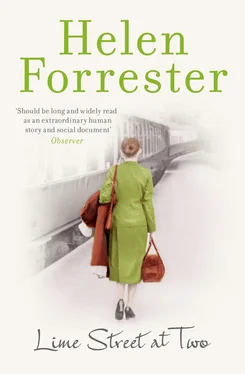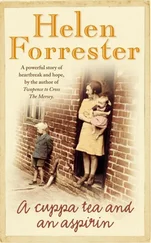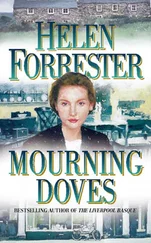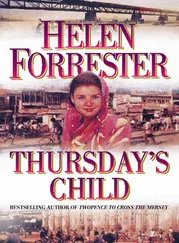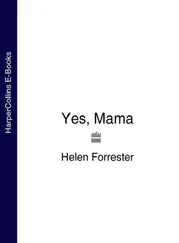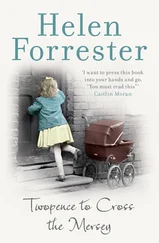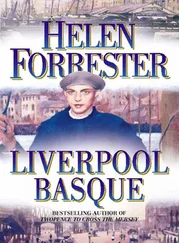1 ...6 7 8 10 11 12 ...15 Picking one’s way to work in a long procession of pedestrians winding through shattered or blocked streets is a memory which must have remained with many people. It always astonished me how clean and neat we managed to make ourselves, despite interruptions in the water supply and the appalling dust raised by the bombing.
Because I had frequently to walk onwards to Bootle, in the north, I was often amongst the earliest people to set out from the south end of the city. I found myself part of a long line of much older women, their heads wrapped in turbans or kerchiefs, a pair of old shoes under their arm or sticking out of a shopping bag. They plodded along stolidly on swollen feet, their varicose veins lumpy under their woollen stockings. Occasionally, they would shout, ‘Mornin’,’ to each other or stop for a word or two, but for the most part they walked in silence, putting first one cautious foot over scattered chunks of brickwork or electric cables and then lifting the other one over. Sometimes they paused to stare back at some unusual object, like a bath, lying in the road, or to watch the firemen and rescue workers at a particularly large scene of destruction.
They were the cleaning ladies of Liverpool, often leaving homes that had been damaged in the previous night’s raid, to go into the city to make ready the offices and shops before their staff arrived. Increasingly frequently, they found nothing left to clean, only a dangerous mountain of rubble or a burning skeleton of a building. Many businesses, however, had reason to bless them, when the building was still standing, but all the windows and doors had been blown out and stock or papers were scattered everywhere. Imperturbable, they would pick up, shake and sort, until they had the floors fairly clear. Then, if the electricity was still working, they would plug in their vacuum cleaners and assail the all-enveloping dust. If there was no electricity, out came brooms and mops, buckets and floor cloths. To the nervous, excited clerks and shop assistants, when they arrived later, these women were quiet symbols of stability.
As the winter crept in, loss of windows became hard to bear, both at home and at work. The sweeping rain soaked many a home and office, despite people’s efforts to keep it out by nailing old rugs or linoleum over the gaping frames.
Our office in Bootle was no exception. I arrived one morning to find snow thick on the ugly brown linoleum of our second floor office, and a great drift up against my desk.
With icy fingers, I carefully shook the flakes off the precious files on the top of my desk and that of Miss Evans. I lifted the telephone receiver and wiped it. Immediately a sharp voice asked, ‘Number, please?’ I thanked heaven that it was working, as I quickly put the receiver down again.
Using a piece of cardboard, I shovelled the freezing piles out through the glassless windows. But there was still a lot on the floor when the rest of the staff arrived. ‘Be careful not to slip,’ I warned our voluntary helpers, as they tiptoed through the puddles.
As the day progressed, the remainder of the snow melted under tramping feet, leaving the office dank and miserable for days afterwards.
I learned to be very afraid of looters.
On the ground floor of the old house which was our office, we had a room filled with clean, second-hand clothing, for the reclothing of the bombed out. Not only were people sometimes clad only in their nightclothes, when their house came down about their ears, their day clothes could be ruined by such a catastrophe; every stitch in the house could be torn, impregnated by glass or ruined by spouting water-pipes and thick dust. Everything had to be replaced – and Bootle was poor, terribly poor.
One frosty morning, as I hastened up the street, I saw that the office had again lost its windows during the night. My exhausted colleague had succumbed to influenza, and I wondered who I should talk to in the Town Hall in order to get a fast replacement of the glass.
As I unlocked the front door I heard the sound of voices. At first I thought it was the women who ran another charity on the ground floor, but then I realised with alarm that it was men’s voices I was listening to.
The door of the clothing room was ajar, and I ran forward and flung it wide.
A sheet had been spread over the centre of the floor and two men and a woman were tossing clothing on to it.
‘What on earth are you doing?’ I asked indignantly.
One man paused and looked up at me. He was burly, in shirt sleeves, with huge muscular arms covered with black hairs. A docker, I guessed.
‘You get out of here,’ he growled. ‘And mind your own business.’
‘This is my business.’ My voice rose in anger. ‘You don’t belong here. Get out yourself before I call the police.’
The three dropped the clothing they were holding, and looked uncertainly at each other. They did not move.
‘OK. I’ll call them.’ I moved towards the door.
‘Oh, no, you don’t.’ Both men advanced on me, their feet tangling in the pile of clothing lying on the sheet.
I quickly pulled the door shut in their path. The lock was broken, but it might hold them up for a second or two.
Light and fleet, I sped up the stairs, thrust the key into the lock of our office, slipped inside and locked it from the inside. I seized the telephone and thankfully asked the operator, ‘Police, quick.’
After a solid night of bombing, the police number was engaged. The men were pounding on the door and shouting threats. ‘Call the ARP. There are probably more people there,’ I told her.
Though she had been afraid of interrupting a police telephone conversation, the operator unhesitatingly broke into the conversation on the ARP phone, and asked for help.
The men outside must have heard the relief in my voice, as I said, ‘Thanks very much.’ By the time two volunteer wardens pounded up the stairs, the looters had fled.
I was still trembling when the first volunteer member of our staff arrived. I asked her to re-sort and hang up the clothing again, and a little later on, presumably as a result of the wardens’ report, our windows were boarded up by workmen, who arrived unbidden by me.
We had some funds which could be lent to men who had lost their tools in a raid or to replace smashed spectacles, and alleviate similar woes, which were not covered by any governmental source. Ready cash was kept in an old-fashioned cash box, locked in a cupboard overnight. On a bleak November day, while my superior was still sick, I put the cash box out, ready, on the desk, and went to the waiting-room to check the number of people there.
A boy passed the waiting-room door. I presumed he had brought a message from his family; it was a common occurrence, and I went back to deal with him.
The boy had flitted silently out, taking the cash box with him.
I was appalled, and immediately sent for the police.
Two plain clothes men, they sat and warmed themselves by our dim electric fire, and sighed and rubbed their hands.
‘Normally we could pick ’im up as quick as light,’ one of them said. ‘Anybody with that much money to spend sticks out like a sore toe. But now …’ he shrugged, ‘with all the high wages … well.’
The thief was never traced. It was a sore loss to our small organisation.
During my harsh days of mourning, I learned a lot of sad truths. It was a revelation to me that the poor would steal from the poor. Working-class solidarity had been preached to me consistently by Communists working in the main office; the poor stood shoulder to shoulder against the wicked, exploiting upper classes. But, in truth, they prey on each other, with a ruthlessness which was, and still is, hard to swallow. Who has not seen decent city-built housing, built specifically to help those who could not afford much rent, stripped bare as a skeleton, of tiles, fittings, lead for the roof, by people who must have been close neighbours, to know even that the house was not yet occupied?
Читать дальше
